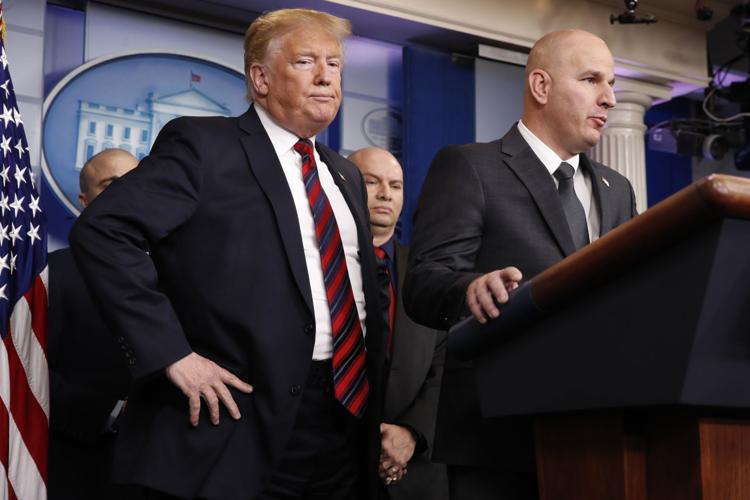Leaders of the union representing Border Patrol agents have taken gambles before — they endorsed the improbable presidential candidate Donald Trump in the 2016 GOP primary.
But that’s nothing compared to the gamble they’re taking now, dragging their 12,700-or-so union members and the whole country into the bet with them.
The top leaders of the Tucson-based national union have taken the position that union members should go without paychecks and the government should partially shut down in order to leverage greater funding for border walls from Congress. It’s like a twisted version of a strike: Agents will work without pay until Congress gives them what they want.
The 3,000-plus agents in Southern Arizona are scheduled to miss their first paycheck of the shutdown Jan. 11, though they will undoubtedly receive back pay whenever the shutdown ends. Missing a check or two, of course, still hurts as bills come due.
Brandon Judd, the union president who worked a decade stationed in Naco, and Art Del Cueto, the vice president originally from Douglas and stationed in Tucson, have given President Trump the backing he needs to stand firm on the shutdown. Without these agents endorsing Trump’s move, it would be hard for the president to claim that relevant interest groups think his promised barrier is worth this bother. The union representing CBP port inspectors, for example, is firmly against the shutdown.
But there they were Thursday — Judd, Del Cueto and fellow union vice president Hector Garza of Laredo, Texas — standing at the podium with Trump in the White House briefing room. The briefing was apparently a spontaneous outgrowth of a meeting Trump had with them that day. But they freely gave Trump the backing his shutdown requires — and thereby, perhaps unwittingly, gave Border Patrol agents responsibility for the increasingly painful move that is leading to damage at federal lands, federal grants and loans withheld, and sick-outs by TSA agents at airports.
“Anywhere you look where we have built walls, they have worked. They have been an absolute necessity for Border Patrol agents in securing the border. We need those physical barriers, and we appreciate President Trump and all of his efforts in getting those physical barriers,” Judd said, turning and acknowledging the president when he said Trump’s name.
Judd added testily: “There’s also a lot of talk on this shutdown that federal employees do not agree with this shutdown. I will tell you that’s not true.”
How Judd could speak for hundreds of thousands of federal employees outside his union — people who his union put into this predicament — was unclear. A recent poll showed 71 percent of federal workers oppose the shutdown.
After Judd, Del Cueto came to the podium and said: “We are all affected by this shutdown. We have skin in the game.”
But you have to wonder what the rank-and-file of their union really stand to gain from the leaders’ gamble.
The agents’ union itself has long questioned spending on border walls. Even after Trump took office, in March 2017 the union put out a response to his proposed border spending, delicately questioning the need for spending on walls: “Although we welcome these additional resources, we fully understand that resources for border security are not unlimited. Tough choices will have to be made as to which investments will have the greatest impact on border security, and this includes funding for ‘the wall.’”
In Senate testimony that same month, Judd said, “We don’t need a great wall of the United States. We don’t need 2,000 miles of border wall. I will tell you, however, that a wall in strategic locations is absolutely necessary.”
His perspective at that time dovetailed nicely with research in 2016 by a team of Arizona Daily Star reporters who traversed the entire border and concluded that almost all the stretches of border that could benefit from barriers already had them. My own reporting in 2017 found wasteful, unnecessary fences built at the base of impenetrable mountains in Southwestern Arizona at a cost of $3.2 million per mile.
And agents themselves, when they volunteered ideas for improving border safety in their areas of the Mexican line, mentioned a fence or wall in less than 5 percent of 902 suggestions collected by Customs and Border Protection, Democrats on the Senate Homeland Security Committee reported in March. Improved border security has not meant big spending on a border wall, even in the opinion of agents and their union, until now.
So, considering their previous stances, I don’t buy that the union leaders have suddenly realized they were wrong about the wall before, and that the $5.6 billion Trump is demanding for border barriers is not only necessary now, but makes shutting down the government worth it. I suspect the union is engaged in a high-stakes quid pro quo, helping Trump in this crucial political moment in exchange for Trump helping them somehow.
Neither Del Cueto nor Judd would speak with me for this column. They represented 12,719 union members as of the last federal filing, in 2017, down from a high of 14,595 in 2012.
As president, Trump has shown no great sympathy for the bread-and-butter issues of the federal workforce that you would think would be top priorities of the Border Patrol agents’ union. Last May, for example, he issued an executive order that limited some federal union representatives to spending no more than 25 percent of their work time on union business. On Dec. 28, Trump ordered a pay freeze for federal workers, voiding what would have been an automatic increase for Border Patrol agents and hundreds of thousands of other federal workers.
While the union leaders do have “skin in the game,” as Del Cueto said, it’s not as much skin as the thousands of member agents who are not top union officials. An annual report for 2017, the last one filed, shows Judd made $16,800 in annual salary from the union, along with $83,366 in “disbursements for official business” — presumably the expenses of traveling the country as union president. Del Cueto also made $16,800 in annual salary but only took $8,142 in disbursements for official business.
So, while the top union leaders do have their salary as agents at risk, they have an additional, smaller source of salary that will help. And their prominent role during the Trump presidency has likely expanded their career opportunities. Judd’s political prominence and connection to Trump have made a national name for him that could ease him into a new, public career outside the union, even elective office if he chooses to pursue it.
Del Cueto, too, has made a national name for himself that could benefit him if he were to leave the patrol. Beyond the Green Line podcast, he also appears on national TV shows and has networked with anti-legal-immigration groups like the Federation for American Immigration Reform, whose conference he attended.
The rank-and-file agents they’re leading into this risky political and financial position are not, of course, getting exposure and future career opportunities from the shutdown. They’re shouldering the financial risk that Judd, Del Cueto and Garza are putting on them, possibly to make some sort of deal with the president.
On his most recent, weekly Green Line podcast, Del Cueto advised agents to tighten their belts.
“By the time you listen to this show, it’s a couple of days before New Year’s Eve,” Del Cueto said. “So you may want to hold back on that champagne. You may want to lean more toward Natty Light — Keystone Ice if you’re really a rock star.”
It was a joke, of course, but Del Cueto’s broad perspective was puzzlingly that of a person who was receiving the effects of the shutdown, not helping impose it in the first place. In fact, he, Judd and the union leadership are central to making the shutdown happen and keeping it going.
So, what are the member agents going to get out of this? Yes, some new barriers in some areas could be useful, maybe making their jobs marginally easier or safer. But the gamble ought to win the rank-and-file a lot more than that to make it worthwhile, and not just advance the careers of the top leaders.
If they don’t get something more, the members know who to hold accountable — and so do the rest of the American people hurt by the union’s political gamble.





